Over the past couple of years, we've seen an ingredient added to all kinds of muscle-builders, creatine powders, and pre workouts: betaine.
Is this the "next creatine"? Is it worth taking?
TL;DR
- Yes, take it.
- Betaine works similarly to creatine, but differently enough that we suggest taking both for size and strength gains.
- The best studies on trained athletes are at a 2.5g/day dosage, but results may be seen at as little as 500mg/day.
- It is safe and well-tolerated.
- New research in 2018 shows that betaine works for women too
-
You can get bulk betaine on PricePlow, but many of our favorite products have it:
-
Daily Muscle-Builders:
- iForce Finish Line (2.5g)
-
What is betaine? Where is it from? How does it work?
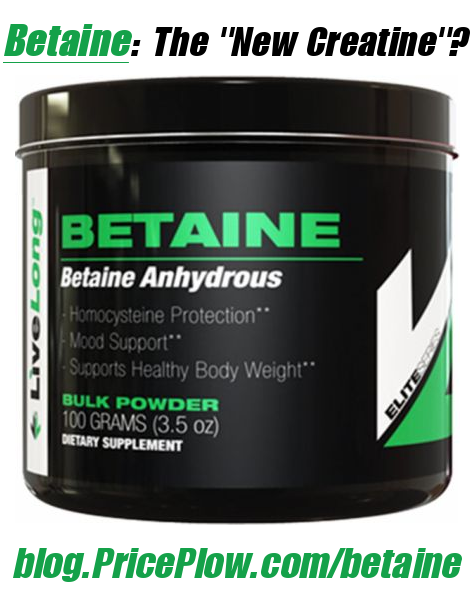
Is it the "new creatine"? Tough to say, since it behaves just like it. But users who take both definitely report some great effects, and the research on trained athletes backs it up.
Betaine, also known as Trimethylglycine (TMG), is a natural chemical compound that is found in several biological systems. It primarily serves as an organic osmolyte, which is something that takes water into cells to protect against osmotic stress. In addition to this it is also a methyl donor.
TMG got the name betaine after its discovery in sugar beets. Structurally, it is a small trimethylated amino acid existing in zwitterionic form (a neutral molecule with a positive and negative charge, these are also called inner salts) at a neutral pH. The amino acid is glycine, hence the name, trimethylglycine. In addition to being found in sugar beets, it is also found in wheat bran, wheat germ, spinach, wheat bread, and shrimp.[1]
Betaine's Benefits
As mentioned above, betaine has two distinct mechanisms of action:
- It is an osmolyte compound (similar to creatine), which works by preserving cellular structure making them more resilient to stress. Essentially what it does is maintain the water balance of the cell.
- It also functions as a methyl donor. What this means is that betaine, being trimethylated, has the ability to donate a methyl group. This is important, specifically for humans, because it results in the reduction of homocysteine.[2]
What is homocysteine and why is it bad?
Homocysteine is an amino acid and a breakdown product of protein metabolism. In high concentrations, it's been linked to an increased risk of cardiovascular complications such as heart attack and stroke. As a result of this relationship, homocysteine is considered a biomarker for cardiovascular health (ie. when homocysteine is elevated then the subject is also at a higher risk for problems).
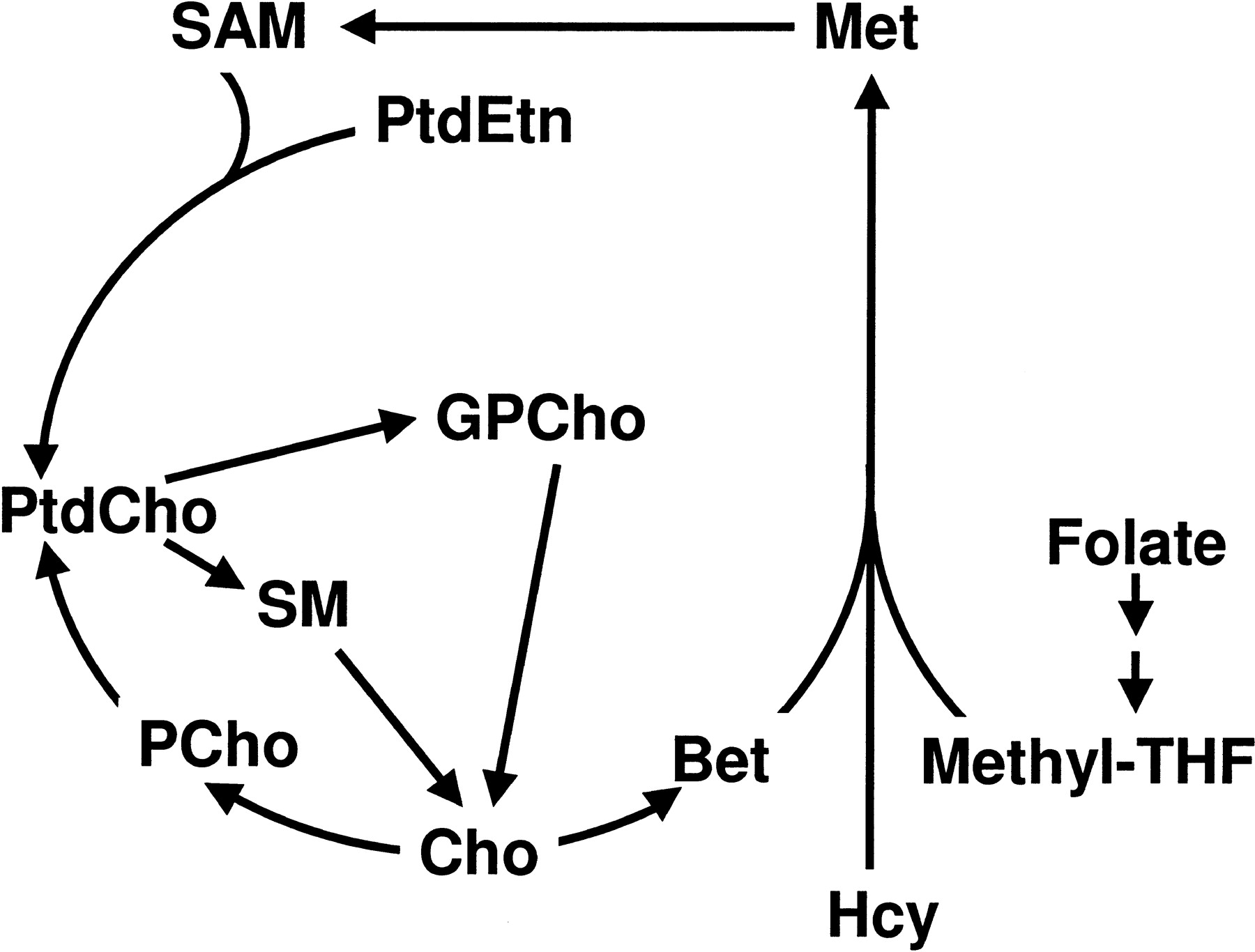
Metabolic pathways for choline and betaine.[1] Phosphocholine (PCho), phosphatidylcholine (PtdCho), glycerophosphocholine (GPCho), and sphingomyelin (SM) are formed from choline (Cho) and can be hydrolyzed to form Cho. The formation of betaine (Bet) from Cho is irreversible. Betaine can donate a methyl group to homocysteine (Hcy) to form methionine (Met). Met is converted to S-adenosylmethionine (SAM), which is an important methyl donor...[1]
In addition to being a biomarker, homocysteine may also play a causative role as well. Elevated homocysteine levels contribute towards the formation of plaque by damaging arterial walls. In addition to its deleterious effects on heart health, it's also been linked to other problems such as osteoporosis, birth defects, macular degeneration, and certain types of cancer.[3]
Reducing homocysteine may have a protective effect for your health, and betaine can assist with that.[2]
Enough about health, what about performance effects?
In addition to the positive health effects betaine supplementation may bring to the table, it also delivers some great performance enhancement effects. In addition to the two primary mechanisms of betaine, there is also a third. Betaine supplementation may result in increased levels of serum nitric oxide concentrations.[4] All three of these mechanisms of action of betaine can have a significant effect on physical performance.
Endurance Performance
While limited, there is some research investigating the effects of betaine supplementation on endurance performance. Namely, it may attenuate cellular acidosis and subsequently improve glycolytic metabolism, which is the process that utilizes glucose during activity to meet energy needs.[5]
Improved sprint time to exhaustion
This mechanism was put to the test in a study conducted by researchers at the Human Performance Laboratory of University of Connecticut. They gave competitive distance runners betaine and observed running performance. The researchers noted increased VO2 consumption and plasma lactate during the final sprint and a trend in improved sprint time to exhaustion in the betaine group.[6]
It is believed that betaine supplementation was able to
- optimize the cellular state of the athletes,[7]
- increase VO2 consumption by increasing protein stability,[8] and
- enhance Kreb cycle efficiency.[9]
What this all means is that by supplementing with betaine, the athletes were able to maintain stability and improve tissue oxygen consumption resulting in enhanced aerobic performance in an environment that is typically highly fatiguing.
Now we're getting somewhere. But "improved VO2 efficiency" doesn't make headlines or sell supplements. Strength and size gains do - which brings us to the best part:
Strength Increases in just two weeks
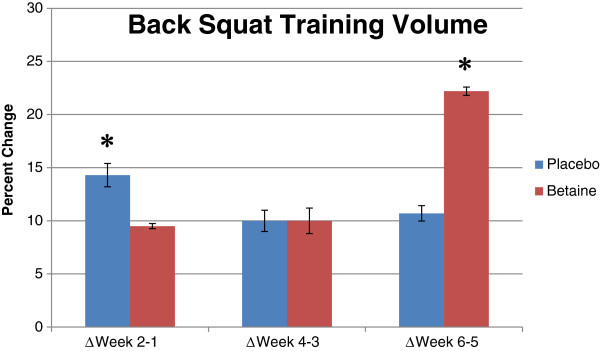
The placebo effect was strong with this group (in Cholewa's study discussed below).[10] But... the real gains obliterated placebo in due time!
Betaine has also been suggested to have the ability to not only enhance aerobic endurance performance, but also to enhance strength-based performance.[11]
Similar to betaine's effect on endurance performance, there appears to also be an anti-fatigue effect here as well. One study found that with just two weeks of supplementation with betaine, participants were able to improved squat repetitions to fatigue thus increasing the amount of training volume.[12]
In addition to the ability to increase work capacity, betaine may also improve power output. In a separate study researchers gave participants betaine and measured power output.
Again, with just two weeks of betaine supplementation, researchers noted improvements in
- vertical jump power output,
- bench press throw power output, and
- force production in the isometric back squat and bench press.[13]
These results were replicated in two separate follow up studies,[10,14] the first of which being a landmark study discussed below. It's important to note that the research on betaine's effects on performance, both endurance and strength related, is at this point is equivocal and requires further investigation.
Now for the part you've all been waiting for: size gains.
Improves body composition (ie builds muscle)
The potential benefits of betaine doesn't stop at its potential to enhance performance. Betaine may also improve body composition, although research on its effects on body composition and hypertrophy are still limited.
Before we even start, realize that betaine has been long been used in animal feed as a way to increase lean mass and decrease fat mass in livestock.[15-20]
...but it requires training
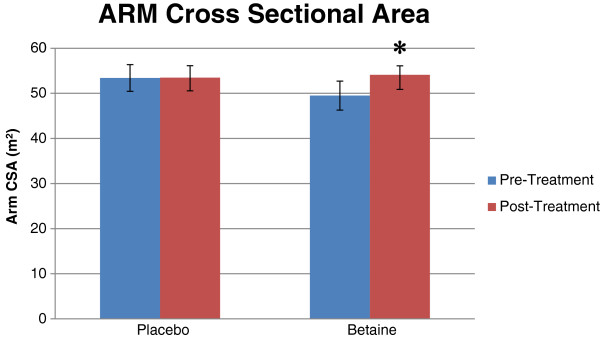
The arms don't lie! Here's one place where placebo doesn't rule: arm size! Betaine/trimethylglycine built bigger arms... in trained subjects![10]
Studies have been done investigating betaine potential to be able to yield similar results in humans but have failed to do so. This is mostly because these studies also fail to duplicate the cellular environment of the animal studies. In the livestock studies using betaine, muscle growth was observed while the animals were in metabolic or nutritional stress. In the human studies that followed, they restricted the participants from participating in any form of resistance training, thus not creating a similar environment to the animal studies.
Thankfully, we're not cattle, so we needed a real study performed on trained athletes. A man named Jason Cholewa was the one to bring home the gold standard in bodybuilding research.
The Jason Cholewa study: betaine in trained athletes
Jason realized that human body composition research was still sketchy because much of it was either done on elderly participants, untrained subjects, or both. What about those of us that are already past our beginner gains?
He got together with his crew at Coastal Carolina University's Department of Kinesiology and performed a study where participants were given betaine and prescribed a resistance training program. This study yielded results similar to the animal ones up above.
Put simply, the participants significantly improved body composition by both increasing lean mass and reducing fat mass.[10]
How good?
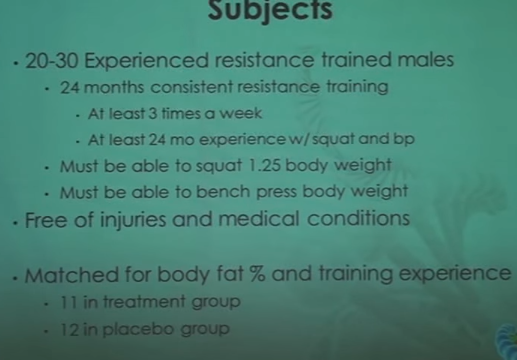
Just so you know these weren't "beginner gains", here's who Cholewa recruited for his research. This is from the 17:30 mark in the video shown below
The method:
- 6 weeks
-
23 subjects, averaging 16.9% bodyfat and 4.8 years of training experience
-
12 given placebo, 11 given betaine
-
- 2.5g betaine per day (1.25g taken twice per day)
The results:
- -3% body fat
- +5.3lbs lean muscle mass
- -6.4lb fat mass
- Increases in arm size
It's that last point that's most interesting. The placebo group had some great gains in squat and bench -- the placebo effect is very very real! But... that all stopped in the last few weeks of the study.
And the biceps don't lie: placebo group gained no arm size, while the betaine group definitely did. Further, the placebo group, despite their placebo-powered strength gains, didn't lose fat - but the betaine group did there too!
Therefore, betaine supplementation may be able to assist with both gaining lean body mass (muscle) and losing fat, but only when combined with resistance training.
Fat loss? Preventing new fatty acid tissue
In the keystone Cholewa study with resistance training, not only was lean muscle mass added, but even more fat was lost! A follow-up study discusses this a bit, but the honest truth is that the full mechanism of action is not fully understood yet, so Cholewa throws out a few ideas:
The mechanisms underlying these effects are poorly understood, but could involve the stimulation of lipolysis and inhibition of lipogenesis via gene expression and subsequent activity of lipolytic-/lipogenic-related proteins, stimulation of autocrine/endocrine IGF-1 release and insulin receptor signaling pathways, stimulation of growth hormone secretion, increased creatine synthesis, increases in protein synthesis via intracellular hyper-hydration, as well as exerting psychological effects such as attenuating sensations of fatigue.[7]
When he says "inhibition of lipogenesis", this means that it's preventing the formation of new fatty acid tissue - ie preventing fat gain.
We hope to understand this better over time, but the results are what count to the vast majority of us, and we have them right here.
If you want to see Jason talk about betaine, here's a 48 minute long video where he discusses his study:
Everyone else can get to what matters: how to take it and what products to buy.
Dosage & Timing
The dose used in the majority of the performance papers have been within the range of 2 to 5g per day. Not enough research has been done at this time to establish an optimal dose-response effect though.
The current research does provide evidence that 2.5g/day of sub-chronic betaine supplementation may improve metabolically demanding strength-based performance and improve body composition, so this dose, as suggested by Cholewa, has become the gold standard.
Betaine can be taken any time of the day and does not need to be coordinated with meals or training.
What is the best betaine supplement? Some products to consider
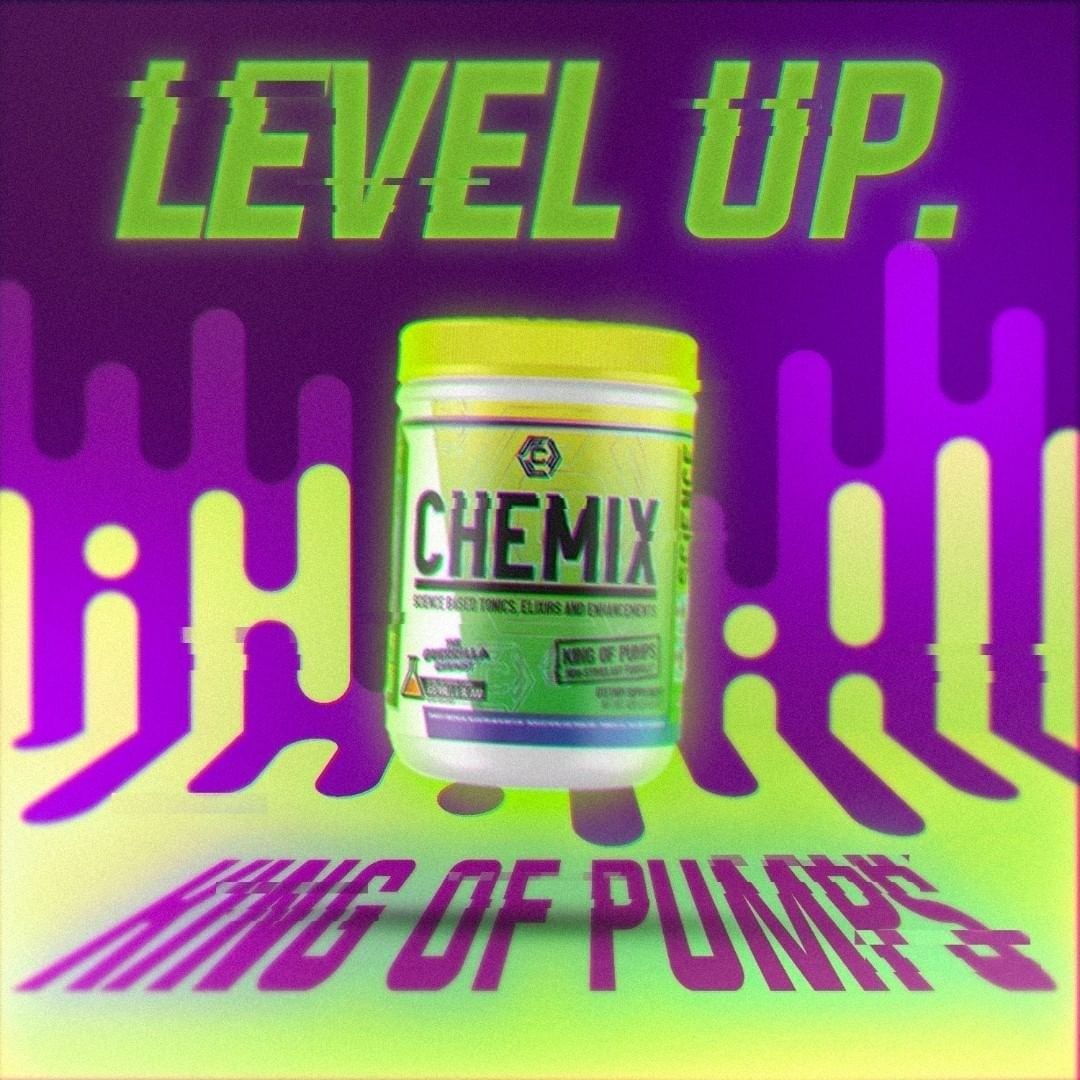
Ready to level up? Chemix King of Pumps will get you there, with a huge dose of betaine
We've written about several products that have betaine inside. We've divided them into three categories: Once-daily creatine supplements, pre workout supplements, and bulk betaine:
-
Daily Muscle-Builders:
- Ghost Size (2.5g)
-
Pre Workout Supplements:
- NutraBio Pre Workout and NutraBio PRE Extreme (2.5g each)
- Chemix King of Pumps Stimulant-Free (5g)
- You can also find the best bulk betaine prices on PricePlow below (sign up for alerts to get notified when there's a good price drop):
Betaine – Deals and Price Drop Alerts
Get Price Alerts
No spam, no scams.
Disclosure: PricePlow relies on pricing from stores with which we have a business relationship. We work hard to keep pricing current, but you may find a better offer.
Posts are sponsored in part by the retailers and/or brands listed on this page.
Creatine + Betaine?
Betaine and creatine do have some overlap in the ways the improve performance and at this point it is not clear whether or not they are synergistic or redundant from a performance standpoint. However, there is no contraindication to taking both (not harmful) and betaine does offer some clinical health benefits that creatine alone does not, specifically its lipogenic inhibiting actions.[7]
All in all, given that both supplements are relatively cheap (especially creatine), a daily dose of 3-5g creatine and 1.5-2.5g betaine is an easy and inexpensive way to build additional muscle and strength for any kind of athlete. Several of the products suggested above provide such doses.
Powders are always cheaper and more cost-effective. The type of creatine does not really matter either - if you can use creatine monohydrate, then great, since we can typically find it for under 3 cents per day on our supplement deals page.
Beyond Betaine: What other Muscle-Building Supplements are there?
If you know about creatine and betaine and want to go further, there's a new generation of muscle-builders worth knowing about. Read our guide on the next generation of muscle building supplements here on the PricePlow blog.
Any Betaine side effects?
First off, realize that the intended effects may count as a "side effect" for some users. For instance, the osmolytic effects may cause water retention. That's fine for most people going to build muscle, but it's not ideal for someone who's in the final throes of a diet.
The only noted side effect of betaine supplementation is sometimes the individual can develop "Fish Odour Syndrome".[21] What this means is that the breath and body secretions of an individual taking betaine may smell, well fishy. However, realize that this happens in extreme medical dosing, such as at 20g per day. We haven't noticed it at even 5g/day.
The situation, if it were to occur, is easily remedied by taking 100mg of Vitamin B2 (riboflavin) twice a day.[22]
Summary
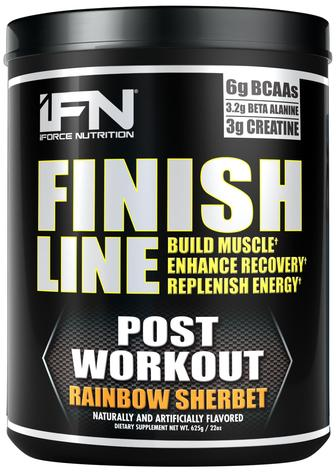
We're finally to the finish line of this paper. iForce Nutrition recently unveiled their new post workout, Finish Line, which contains everything you want to speed recovery and full gains all day long.
While the clinical use of betaine to treat health related conditions such as homocysteinemia and nonalcoholic fatty liver disease is well documented in the literature;[11,23] the ergogenic benefits of betaine is less understood and established. Several mechanisms have been identified and betaine supplementation shows tremendous potential, but more work still needs to be done.
However, there's enough research to realize that those of you trying to achieve natural gains should definitely give betaine a two month run to see if you can replicate the results.
In just about all the studies done that show a positive effect on performance or body composition the dose of betaine used was 2-5g through the course of a day. In most studies, this dose was divided into two separate doses and typically was taken alongside of a meal, although it can be taken on an empty stomach.
Betaine – Deals and Price Drop Alerts
Get Price Alerts
No spam, no scams.
Disclosure: PricePlow relies on pricing from stores with which we have a business relationship. We work hard to keep pricing current, but you may find a better offer.
Posts are sponsored in part by the retailers and/or brands listed on this page.
All posts mentioning betaine on this blog
This list will stay up to date with the latests posts (typically product analyses) that mention betaine:


Comments and Discussion (Powered by the PricePlow Forum)